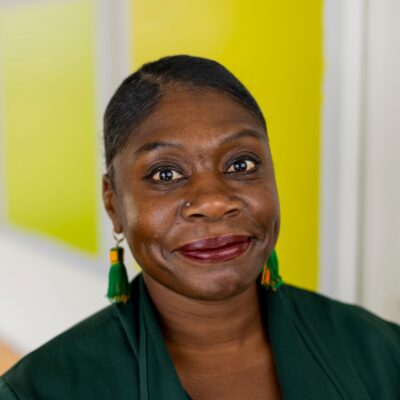Student Spotlight: Jamila Walida Simon

April 28, 2025
Jamila Walida Simon is a doctoral candidate in development studies through the Employee Degree Program from Far Rockaway, New York. She earned her previous degrees at Wells College and Cornell University and now studies the experience of Black farmers in New York state under the guidance of Scott Peters at Cornell.
What is your area of research and why is it important?
I told the story of how I came to be engaged in a cooperative study with Black farmers, the discoveries we made through a relational approach to interviews, and the theoretical and practical contributions our discoveries make to literature about interview methods in qualitative research. This study is more than just conducting interviews; it’s a way of being in a community. Qualitative research promises that it positions the scholar as human. According to Van Klinken (2020, 8), “With all the highly sophisticated talk about decolonizing academic theories and methodologies, I believe that this is the bottom line of any genuine commitment to decolonial scholarship: an interest in understanding and enhancing our shared human condition in a divided and fragmented world.” This work will lend its voice to humanize social science research by way of telling the story and key discoveries.
Then, I explored the pursuit of purpose and the role of race in working with Black farmers in New York state. This work becomes significant because the methodology allows us to engage in deeper relationships with audiences we have not heard from. This process also begins to balance space for practitioners and scholars to come together in the field of purpose studies.
Finally, I applied the lessons we were gifted from the Black farmers’ reflections, anchored by more than 20 years of lived experience as a youth development specialist and as a researcher. We leveraged these experiences to propose changes to agriculture programs that center on healing trauma.
What are the larger implications of this research?
The larger implication for this research includes that Black farmers are a part of the scholarship of Black farming. Research relationships allow for ordinary observations to be included as datasets and help us to tell a fuller story. Last, race and purpose can be tied together for positive means. Perhaps we need to look at race and purpose for other populations in future studies.
What does it mean to you to be a Bouchet Scholar?
I have now taken an oath to exemplify the highest levels of character, leadership, advocacy, and scholarship in my service. I already engaged in these activities and now I have a chance to be a part of a larger community of comrades who have the same aims.
How do you exemplify the five pillars of the Bouchet Society—character, leadership, advocacy, scholarship, and service?
I embody the characteristics of Dr. Bouchet as a scholar-activist, mentor, extension associate, and community member. I have a deep sense of responsibility to serve alongside community members and have used my position as a Ph.D. candidate to illuminate the lives of Black farmers across NYS. I have framed my dissertation research in a way that offers significant lessons from the work of Black farmers and offers a way forward to scholars and community members as they help youth find their purpose in the field of agriculture. I also offer opportunities for lived experiences to stand equally as tall as those from academia in my classroom. In addition, I mentor youth of color in Junior Minorities in Agriculture, Natural Resources, and Related Sciences (MANRRS) chapters as a part of my graduate membership in the Cornell MANRRS chapter. In my work with Cornell Cooperative Extension, I draw connections and build collaborations in communities that need more love. I always build sustainable partnerships that lead to building people and skills that remain in the communities I serve.
The goals of the Bouchet Graduate Honor Society align with my professional goals in that I embody character, leadership, and advocacy. I also lean on building scholarship in spaces that have great potential but where others may not want to work and lead a life of service.
My past, present, and future are riddled with deep ways in which I promote equity, inclusion, a deep sense of belonging, increased awareness and access, and diversity within the academy to benefit scholars and the community. This mutual benefit allows for those from underrepresented backgrounds in higher education to see excellence and have an opportunity to explore what excellence means to them too.
I anticipate continuing to promote equity, access, belonging, and inclusion in my work and my service. I will continue to find spaces that need to see scholars who look like them and continue to build up their capacity to thrive on their way to their level of excellence. Finally, I aspire to invite the students I mentor to consider joining the Bouchet Society as they build their careers as well.
What are your hobbies or interests outside of your research or scholarship?
My hobbies include managing entrepreneurship projects related to real estate, working with youth and families one-on-one, and encouraging young people to find their spark.
Why did you choose Cornell to pursue your degree?
I chose Cornell to pursue my P.h.D studies because it’s where I work and play, and the faculty across colleges would best help me to refine my research.
